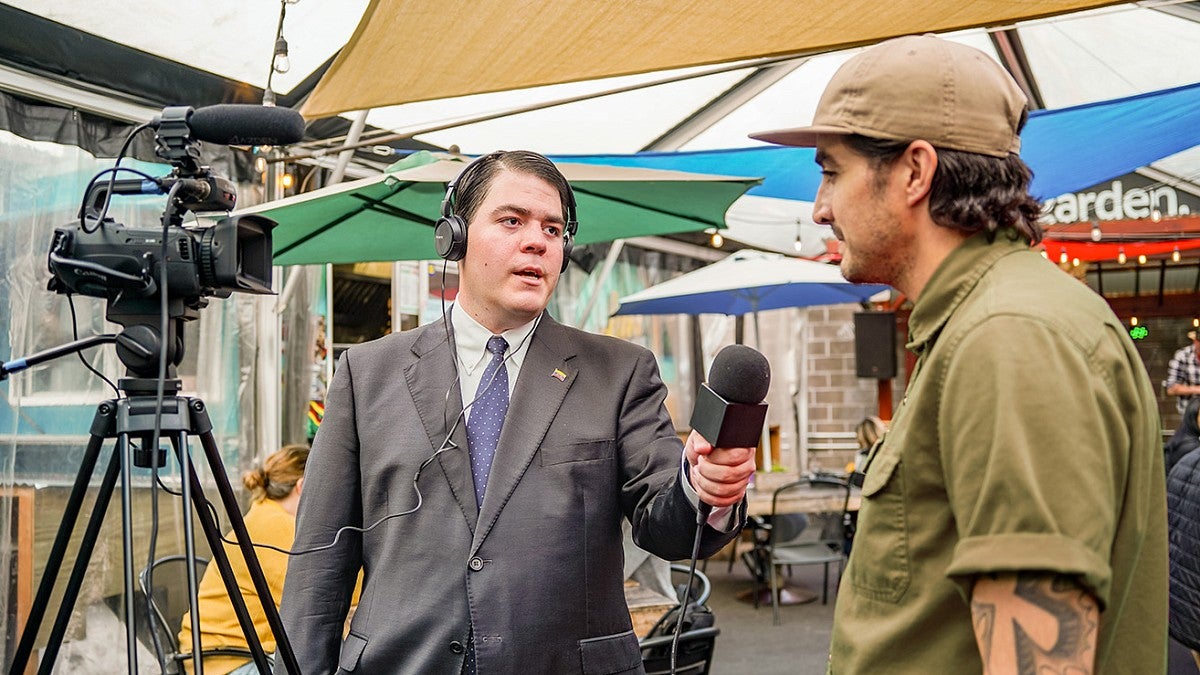
Build your network, hone your writing skills and embark on an exciting, meaningful career.
Journalism has a long history of speaking truth to power. A successful democratic society depends on thorough reporting and compelling storytelling. At its best, journalism brings people together around a common understanding of the truth.
Never before have there been so many ways to harness the changemaking power of nonfiction storytelling, said Will Yurman, director of the Journalism Master’s (JMA) program at the UO School of Journalism and Communication (SOJC). The one-year, full-time program equips students to make their mark as reporters, investigative journalists, photographers, podcasters, sports writers and more.
“There is power in telling other people’s stories, and learning how to do that in an honest and true, factual and ethical way,” Yurman said.
Here are five powerful ways a master’s degree in journalism will set you up for the career you’ve dreamed about.
1. Elevate your career.
A master’s degree in journalism can be your ticket to landing a reporting job at a major news organization, working in sports journalism or telling stories of people in your community for an organization or nonprofit.
It can also mean becoming a podcaster, a documentarian or the lead storyteller on your own website. Whatever your chosen path, the skills you learn will make you better at your job. Just ask our graduates, who have gone on to work at national news organizations such as NPR and the Wall Street Journal.
Journalism is a different kind of storytelling than advertising, fiction writing or journal keeping. In the JMA program, you’ll learn the fundamentals of journalism that are unique to the craft. You’ll take classes focused on traditional journalism, including investigative reporting, feature writing, visual journalism and data journalism.
“These classes will allow students to take the big dream of being a journalist and focus it into something real,” Yurman said.
2. Amplify your voice.
After mastering the reporting fundamentals, students will explore an area that connects to their personal goals. Do you want to research the impact of climate change on Native American communities? Or are you drawn to the future of women in sports? Or maybe you want to tell the story of rural communities who feel they don’t have a voice in our national story.
You’ll tell the stories you’ve uncovered by researching your topic in your chosen medium. The program’s terminal project is an opportunity to create a portfolio-worthy project to show future employers what you can do, which means you’ll graduate with a degree and a project you have brought to life.
“That real-world, hands-on experience is a stepping stone to a career in journalism,” Yurman said.
3. Expand your network.
Most of the JMA faculty are former working journalists with connections in the industry. You might take investigative reporting or data journalism classes with Pulitzer Prize-winning Oregonian reporter Brent Walth. Or take reporting for electronic media or media entrepreneurship with CNN founding producer Ed Madison.
Working with these established professionals will give you a leg up in the world of journalism. In addition, the program brings in nationally recognized speakers every year.
Your fellow students will become a connection to a lifelong network of industry professionals. The JMA program is small, meaning you can form close relationships with your peers, many of whom stay connected as they progress through their careers.
“We are a vibrant journalism program,” Yurman said. “There are lots of opportunities to make connections. Take the year as an opportunity to immerse yourself in the culture.”
4. Enhance your skill set.
After the intense boot-camp experience of the foundational writing and reporting classes, you’ll take a multimedia class, where you’ll build photography, video and audio skills. From there, you’ll choose an area of writing and reporting you’d like to develop. Maybe you’ll hone your feature writing skills, dive into sports writing or explore media law and the ethics of journalism.
Outside of class, you can enhance your real-world, hands-on reporting and writing experience by working on SOJC publications such as Flux, OR Magazine or the Daily Emerald. You can also get hands-on experience working for the local NPR station KLCC or for the local alternative paper, the Eugene Weekly.
“We live in a world now where journalists need to understand at least more than one skill set,” says Yurman. “These skills make you more marketable.”
5. Make a difference.
Journalism is fundamentally about uncovering truth that can inspire positive change. JMA graduates go on to use their skills to advocate for social change nationwide.
Yordanos Tesfazion ’22 created the podcast Diaspora Rejects, featuring immigrants working through generational trauma and cultural barriers. Her experience helped her land an opportunity at NPR Next Generation Radio. Through this program for aspiring journalists, she interned with NPR’s Code Switch and Throughline, where she encouraged intentional discussions about race.
“I feel like storytelling is really valuable in the way that it can help heal, educate and bring people together,” Tesfazion told reporter Kayla Nguyen ’23. “It’s also the oldest form of communication. I would love to continue that tradition to help make the world a kinder place and to contribute to public discourse in a productive way.”
Tesfazion, who is now a content creator for the Seattle Parks Foundation, uses her voice to tell stories of the underrepresented with sensitivity and cultural awareness.
How will you use your voice?
Ready to take the next step?
Request more information or start your application using the links below, or contact our graduate recruiter with questions about our programs, the application process, and admission.
–By Jennifer Snelling
Jennifer Snelling is a Eugene-based education journalist. She graduated from the SOJC with a master’s degree in journalism in 2001.
